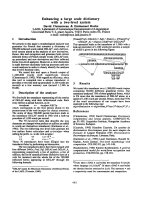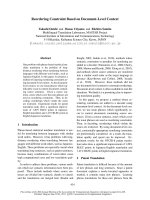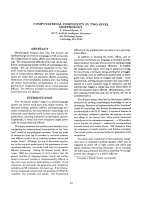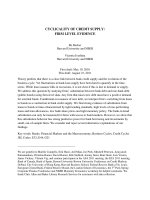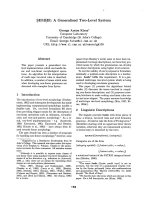NewHeadway- Level B_02 pot
Bạn đang xem bản rút gọn của tài liệu. Xem và tải ngay bản đầy đủ của tài liệu tại đây (72.34 KB, 11 trang )
Synonyms in conversation
a. Mary's family is very rich.
Well, I knew her uncle was wealthy.
b. Look at all these new buildings!
Yes, this city's much more modern than I expected!
c. Her boyfriend's really good-looking.
Well, he's certainly one of the most handsome men in the room!
d. Wasn't that film wonderful!
Yes, it wasn't marvelous.
e. George doesn't earn much money, but he's so kind.
I know. He's very generous to both his family and his friends.
f. Her bedroom's really untidy again.
Is it? I told her it was messy yesterday, and she promised to clean it.
g. Was Sarah angry when you told her?
Yes, she looked really annoyed.
h. I'm bored with this lesson!
I know. I'm really fed up with it, too!
Living in Madrid
I = Interviewer K = Kate Leigh
I Kate, you're lived in Spain for a long time now, haven't you?
K Mm. About eight years.
I So you know it well enough to compare living in Spain and living in London?
K Well, I can compare living in Madrid with living in London
I Ah, yes, all right
K not quite the same thing.
I So what are the main differences?
K I think the first one is the time of day that things happen. People get up later, and
start work later. I start at ten, and lunch time is much longer. Everything closes for about
three hours. Then, at five, people go back to work.
I And what time do they finish?
K About seven or eight. Then they go out, and they go to bed incredibly late about
one or two in the morning.
I Do they have a siesta?
K No, not in Madrid. Well, only summer, because in summer work hours change
because it's so hot. Everyone works from eight thirty to three, then has lunch, then a
siesta, and then goes out.
I So office hours change?
K Everything changes, on the first of June.
I For how long?
K Until the fifteenth of September.
I How did you find the differences of time when you first went out?
K Very difficult, because I was hungry all the time! I wanted to eat about eight
o'clock, but eating is very different in Spain. People eat all day. They have snacks in the
morning, maybe an omelette and a beer, and then have their main meal at lunchtime, and
then tapas, which are lots of little dishes, in the evening.
I So that's what do you now?
K OK, yes. I like it. The Spanish think that the English eat very little!
I And what about the people?
K Well, this is the second big difference. People live in the streets, they live much
more outdoors, so you see them more, and it's easier to get to know them.
I So you think it's true that the English are cold?
K No, but they live differently. Madrid is a lot smaller than London, and people live
in the centre. It's not like London where people live in houses in the suburbs. In Madrid
people live in flats in the centre, so it's natural to be out on the streets most of the time.
I And how do you find living in Madrid?
K I think it's nicer. It's a lot cheaper, and shops are open longer. I find it safer, I can
be out in the streets at all hours, and there never any problem. The family is still very
important. I think people are more caring other people, if you see what I mean.
I Mm. Anything else about the people?
K Er They are terrible drivers! There are a lot more accidents road accidents.
And this is strange, because the public transport system is very good and very cheap, but
people like to use their car.
I There's an Underground, isn't there?
K Mm, with a flat rate fare, so you get ten tickets for about two pounds.
I That's very good. Are you thinking of coming back to England?
K Er sometime, but not yet! The weather much better, and I like living in a
southern European atmosphere!
Directions
When you come out of school, turn left. Walk past the library and through the park until
you get to the cinema. Turn left and you'll find the bus station. Take a number 16 and get
off at Blackwood that's B-L-A-C-K-W-O-O-D. Go under the bridge and turn right. Go
to the end of the road and turn left. My house is the fourth on the right. It's the one with
the red door.
FAME
How long?
T = Tony A = Ann
T Where do you live Ann?
A In a house near Brighton.
T How long have you lived there?
A For three years.
T Why did you move?
A The house we had before was too small. We need somewhere bigger.
T What do you do, Ann?
A I work in a bank.
T How long have you worked there?
A For eight years.
T What did you do before that?
A I worked for a travel agent.
Interview with a musician
I = Interviewer P = Paul Carrack
I How long have you been in the music, business, Paul?
P For about twenty years, I guess, I've never had another job, er no, never.
I've only been a musician.
I And how old were you when you started playing?
P It was when I was just a kid, I've taught myself to play. I tried a few
instruments first the drums that was when I was only five. After that it was the
piano, and then later keyboards.
I Do you play any other instruments?
P Only the guitar. I play the guitar sometimes. That's all.
I When did you start playing professionally?
P While I was still at school. I left school at sixteen. I was playing in a band,
working on Saturday evenings in pubs and clubs. When I left school, my only
ambition was to be in a pop group.
I And which group have you played with over the years?
P Let me see I'll try and remember. I've played with Roxy Music, and The
Smiths, er I've given concerts with them. And then I've made records with the
Pretenders and Madness and of course Ace, I mustn't forget Ace.
I Why is Ace so important to you?
P Well, I had my first hit record with Ace, er that was in 1974. The song was
called How long? and it was a big hit all over the world.
I And now you're with Mike and the Mechanics. How long have you played
with them?
P Since 1985. We've made a couple of records and we've done two tours of
America. I'm the singer the vocalist. Mile plays the guitar.
I Do you travel a lot?
P Well, er I often think that I've traveled all over the world, but I haven't
really. I've worked a lot in Europe er Germany, France, Italy, and then of course
in America. I always wanted to work in America. I was really pleased when some of
my records were successful there. But erm there are lots of places I haven't been
to yet er Eastern Europe, Japan, South America I'd love to play in these places.
I Paul you've obviously made a lot of records. Do you know exactly how
many?
P That's a difficult question, erm
I Well about how many?
P Oh, I don't know. Perhaps about twenty yeah, probably about twenty.
I And have you always worked with groups? Have you ever made a record on
your own?
P Yes, last summer. I made in the summer and it came out in October. It's
called Groove Approved.
I And is it doing well?
P Erm quite well, especially in America. My records are often played on
radio there more than here in Britain. People have heard of me there erm I'm
not a superstar of course I'm not but people know my name and then they buy my
albums!
I And so this has been a busy year for you?
P Yes, yes, I've had a very busy year. I've toured the States twice with Mike
and the Mechanics and I've made my own album and I've done a tour of
Germany So yeah, a busy year, but a good one.
I And something you've forgotten!
P What's that?
I You've had a number one record. You were top of the pops in February!
P That's right! It was called The Living Years. It was number one in Britain
and in America!
PROS AND CONS
a
Opening a restaurant
M = Man K = Kathy
M I hear you're going to open a restaurant. Is that right?
K Mm. That's right.
M With your husband?
K Yes. It's something we've always wanted to do.
M Well, good luck. I wouldn't like to do it.
K Why not?
M If you run a restaurant, you have to work very long hours.
K You work late, it's true, but you don't have to get up so early in the evening.
M And another thing. You have to work in the evenings and at the weekends, when
everyone else is enjoying themselves!
K Well, I like cooking and entertaining, so that's all right. In the shop, there was no
variety. If you have a restaurant, you don't have to do the same thing every day. Every
day is different!
M I think you're taking quite a risk.
K Well, we'll see. I want to be my own boss.
Then you don't have to work for someone else. And I hated the uniform in the
shop!
M I'll be your first customer!
b
have to
don't have to
Do you have to?
You have to work long hours.
You have to work at the weekends.
You don't have to get up early.
You don't have to work for someone else.
Do you have to wear a uniform?
Do you have to work outside?
Holidays in January
1.
In January it is very, very hot all day and all night! So you only need light clothes, not
even a jumper. The most important thing is your swimming costume, because we spend
most of the time on the beach. You can go surfing and windsurfing, but we like just to sit
on the beach and talk, and watch all the beautiful people walking by! But you shouldn't
take anything valuable to the beach or someone will steal it! As for money, well, we have
very high inflation, so it's best to take dollars and change money daily.
Restaurants are quite cheap. You can get a good meal for about two dollars. Our
speciality is feijoada, which is black beans and different kinds of meat. It is served on
Saturdays, and of course the fish and seafood are great because we're next to the sea! You
must try a caipirinha, which is a drink made of rum and lime, but don't drink it too
quickly! It's very strong! The fruit juices are fantastic.
In the evening, go to the piano bars and listen to some jazz or samba. We have some of
the best live music in the world. And of course you must go up the Sugar Loaf Mountain
at sunset! It's amazing!
2.
It's usually quite mild in January, and it doesn't often rain, so you don't have to bring
warm clothes. But you'll need a light coat and jumper as it can get cool in the evening.
There are some wonderful museums, especially the Museum of Islamic Art, and the
mosques are beautiful.
If you want to see the Pyramids, it's best to go on horseback, and I think you should go in
the early morning or late afternoon.
Bring traveller's cheques with you. You can change them very easily, but you have to
change money in the country, because you can't take any money out of the country. The
best place to try the local food is in the city centre. You could try some koftas or kebabs,
which are meat, usually lamb, or falafel, which is a kind of bean ball mixed with herbs,
and fried until it's crispy. To drink, one of the nicest things is mint tea, especially if it is
hot. It is very refreshing. If you have time, you really should go on a Nile cruise, and
there are places that are difficult to get to by land.
3.
Well, in January, it can be very cold with snow everywhere! But high in the mountains
the sky is usually blue, and it's warm enough to have lunch outside. You should bring
warm clothes and some strong water proof shoes.
Most people go skiing every weekend, and if there's no snow you can still do walking in
the mountains. A lot of the towns are very pretty. They look exactly the same today as
they did four hundred years ago!
You must try fondue, which is cheese melted in a pot, and you put pieces of bread on a
long fork to get it out mm! It's very, very good.
If the weather's good, you can go for a boat trip on the lake. Then you can really see how
beautiful the mountains are!
Invitations
1.
A = Alice J = Jane
A Hello Jane! How are you?
J Fine, thanks. And you?
A OK Jane, what are you doing tomorrow night? Would you like to go to the
cinema? Kate and I are going to see The Moon Man.
J I can't, I'm afraid. I have to finish my project by Friday, and it's nowhere near
ready.
A What a pity! Never mind.
J Thanks for the invitation.
A That's OK.
2.
B = Barbara T = Tony
B Hello, Tony. How are you?
T Very well, thanks. And you?
B Fine. Listen, Tony. What are you doing on Saturday evening?
T Er Nothing special. Why?
B Would you like to go out for a meal?
T That would be lovely! Where do you want to go?
B Well, I like Italian food, as you know
T Mm, me too!
B How about going to Giovanni's?
T Great! Shall we meet there?
B Yes, why not? What time shall we meet?
T Eight o'clock?
B Yes, that's fine.
T Lovely. See you then.
3.
D = David A = Alice
D Hello, Alice. Are you all right?
A Yes, thanks. How about you?
D Mm, fine, Alice. I was wondering, are you free tomorrow evening? Some friends
are coming round to my house for a drink. Would you like to come?
A That's very kind, David, but I'm going to the cinema with Kate. Sorry.
D That's all right. Another time.
A That would be lovely.
LIFE IN THE 21ST CENTURY
Jenny and Mark
J If I don't go out so much, I'll do more work.
If I do more work, I'll pass my exams.
If I pass my exams, I'll go to university.
If I go to university, I'll study medicine.
M If I stop smoking, I'll have more money.
If I have more money, I'll save some every week.
If I save some every week, I'll be rich when I'm thirty.
If I'm rich when I'm thirty, I'll have my own business.
How 'green' are you?
I = Interviewer J = John Baines
I John, I know that you're interested all things to do with the environment and
the need to protect it.
J Right.
I Can you tell me some of the things you've changed in your lifestyle to become
a green person?
J Oh, yes. I could erm I could think of one or two things that I've tried to do
over the last couple of years. I think it's a couple of years since I got my bicycle out
of the garage and repaired it, and now I use it as much as possible. I use my car less.
I try to do ten per cent fewer miles every year, so last year I drove eleven thousand
miles, and this year I'm going to try to do only ten thousand.
I So does this mean that you travel less?
J This doesn't mean I travel less, this means I walk more often. When I do my
shopping, I always walk now. I use public transport when I can, usually going by
train.
I I'm sure your car runs on unleaded petrol.
J Yes, it does. It's cheaper, and it keeps the air cleaner.
I So that's transport. What about in the home? What's different in the
kitchen?
J Well, I save as much as I can. I don't throw it away. I have different bags for
different things. One bag has all the cans going into it from the cat food to the beer.
The second bag has all the papers going into it, and the third bag has bottles, from
er olive oil bottles to wine bottle to lemonade bottles. But the milk bottles still go
on the doorstep so that they can be re-used.
I And what do you do with these bags?
J I take them to places where they can be recycled. There's a place in the
village where you can take them.
I And have you changes any of the things you buy?
J Yes. I get washing-up liquid and washing powder that doesn't harm the
environment
I But does it get your clothes as white?
J I don't think my washing was ever very white actually. No, it's fine.
I We were talking about food. I know you're become a vegetarian. Is this part
of being green, on something totally different?
J Erm yes and no. Looking after animals, I think, is as important as looking
after the environment. I mean, they're part of it. So I prefer not to kill animals to eat
them. Animals eat food that people could eat. But if people want to eat meat that's
their decision.
I Mm. I think it's true that people all over the world are becoming more aware
of the need to look after the planet. If we don't look after it what will happen do
you think?
J If we don't become more friendly to the environment then the environment
will make it more difficult for us, so that our life will not be as comfortable. I think
we'll survive
I Oh good!
J but these are very important times.
Here's your ticket and boarding card.
Do you have any hand luggage?
It leaves from platform eight.
Can I have a day return, please?
Would you like smoking or non-smoking?
At the check in desk
A Hello. Can I see your passport and ticket, please?
B Here you are.
A Thank you. Do you have just the one case?
B Yes.
A Do you have any hand luggage?
B Just this one case.
A That's fine. Would you like smoking or non-smoking?
B Non-smoking, please.
A Right. Here's your ticket and boarding card.
B Thanks.
A Your flight will board at gate 14 in about an hour's time. Have a good trip!
B Thanks. Bye.
At the railway ticket office
A Good morning. Can I help you?
B Yes, please. I want to go to Edinburgh. When's the next train?
A Let me see. There's one at 10.42. You change at Doncaster. And there's
another at 11.15.
B Is that direct, or do I have to change?
A That's direct.
B What time does it arrive?
A Which one? The 10.42 or the 11.15?
B Er the 11.15.
A It gets in at 14.40.
B Right. It's have a return ticket then, please.
A When are you coming back? Are you coming back today?
B No, tomorrow.
A Ah, so you can't have a day return. You need a period return. That'll be
78.40.
B Can I pay by credit card?
A Yes, certainly.
B Here you are.
A Thank you.
B Which platform does it leave from?
A Platform 3.
B Thanks.
A Goodbye.
THE WAY WE WERE
Memories Molly Harrison
I can remember it all so clearly! I used to go dancing every Saturday. We used to go for
picnics. The roads didn't use to be busy. We used to go to the pictures twice a week. It
used to cost six pence.
Memories Linda Carr
We shocked our parents. We used to do things that they never did. We wore mini-skirts,
we went dancing at discotheques, and we went to pop concerts.
I got tickets for a Beatles concert in 1965, and I travelled all the way to Liverpool to see
them.
My parents bought me a record player for my fourteenth birthday. My friends and I
listened to record nearly every night. We didn't watch TV much then, but our parents did.
Our family had a Mini, and once we went camping in France in it.
When we were students we wanted to change the world. We said Make love not war .
We often marched to ban the bomb. In 1968, there were student revolutions in many parts
of the world.
So many things happened in the 60s. President Kennedly was killed in 1963, they landed
on the moon in 69, and the Berlin wall they built that in er let me see I think that was
1961. Well I'm pleased some things change!
Questions
A Who did you talk to at the party last night?
B Oh, Jenny and Tom, but Jenny mainly.
A What did you talk about?
B She was telling me about her new job.
A Who did you dance with?
B No one. By the way, did you know that Belinda is going out with Steve?
A No. Who told you that?
B Tom did. Someone saw them together in a restaurant.
A Who saw them?
B Annie did.
A Huh! You can't believe Annie!
B Well, you don't know what Annie said.
A Why? What happened in the restaurant?
B Well, when Annie saw them they were very surprised, and then they
Bill Cole talks about when he was young
I was born in 1919, er May 7th 1919. I was the eldest of four. I had one brother and two
sisters just the youngest sister is still alive. I'm a true Cockney. We lived in the East End
of London. We had two rooms above a fish and chip shop. Number 18 India Street, it was
next to the river. The rooms always smelt of fish. We didn't have much money, but we
ate well not only fish and chips. Dad worked in the fruit and vegetable market at Covent
Garden. He used to bring home all kinds of fruit and veg. Ma was a cleaner and she
worked in offices and hospitals.
Dad used to start work at four o'clock in the morning and from when I was seven, it was
my job before school, to run to the market with his breakfast. I used to love doing that.
Best of all were the days when he said: Don't go to school today, son. Stay with me.
You'll learn more about life here. But don't tell your Ma!
He was right the noise, the men and women shouting and laughing, the colour, the
smells it was wonderful. At lunchtime we got pie and peas twice, for six pence. I can
still taste that pie and peas best taste in the world!
Then Dad died when I was twelve. I had to help Ma look after the little ones. So I left
school and started to work full time in the market. I did it for ten years. After that I was
taxi-driver. It's been a good life.
Camilla, Duchess of Lochmar, talk about when she was young
I was born on May 7th, 1919, at the family home, Foxton House, in Leicestershire. Our
family has lived there for generations. We have the most beautiful gardens. People used
to travel miles to see our rose garden in June. The smell of the roses came right into the
house. I was the youngest child and the only girl. I had three older brothers much older.
They weren't there while I growing up. Two were in the army and one was at Oxford
University. Of course, my mother and father used to spoil me, my father especially. He
used to call me his little princess . He died when I was sixteen. It was a terrible time for
mother and me. Fortunately, I was at home with her. I never went to school. I had a
governess for a few years, so I didn't have much education. My mother thought it was
more important for a girl to learn to dance, to go to parties, and look pretty. She wanted
me to find a good husband after my father died. My best memories are the two years
before I married all those dances and parties. I loved it. But I met and married the Duke
when I was twenty. A good marriage is important. I only knew one girl who got a job.
Poor girls these days, they all have to find jobs! I can't imagine that they have as much
fun as we used to have!
In a restaurant
1.
A Did you have a nice meal?
B Yes, I did. The fish was wonderful, wasn't it?
A Yes, it was. There was so much but we finished it, didn't we?
B Mm. I do like it here. We haven't been here for ages, have we?
A No we haven't. It has a nice atmosphere, and it's very reasonable, isn't it?
B Yes, it is. And the waiters really look after you, don't they?
A Yes, they do. Shall we go home now?
B OK. Let's go.
2.
A Did you have a nice meal?
B Yes. The fish was wonderful.
A There was so much but we finished it.
B I do like it here. We haven't been here for ages.
A It has a nice atmosphere and it's very reasonable.
B And the waiters really look after you.
A Shall we go home now?
B OK. Let's go.
READ ALL ABOUT IT
The world's most loved car
P = Presenter
P This week in Worldly Wise we talk to people about the world's most loved
car the Volkswagen Beetle. Why do so many people love it so much?
Man They're noisy ugly really, but so full of character. They're not very
comfortable, but they're totally reliable. Mine's my friend a reliable, always jolly
friend. In rain, in snow he'll get me there, and we chat as we go along the roads
together Well done! I say. Don't you worry about that big Volvo? Over the years
I've asked my Beetle-owning friends why they bought a Beetle er and they say
that there are some things in life that can never be improved and the Beetle is like
that!
P How did it all start? Well, Volkswagen means people's car . And in 1934,
Ferdinand Porsche was asked by the German Government to design exactly that a
car for the people. A factory was built, and the first distinctive-looking cars were
ready in 1938. Then, of course, there was a problem the Second World War!
After the war, a British officer, Major Ivan Hurst, was put in charge of the
Volkswagen factory. Another officer, Michael McEnvoy, remembered the car from
before the war and he though it would be good for American and British soldiers in
Germany. So the first fans of the car were not the Germans, but British and
American soldiers. And some of them loved it so much that they took their cars back
home!
SONG We found a wonderful bargain,
A little Beetle Volkswagen
He came all the way from Germany
To set the here in this country.



